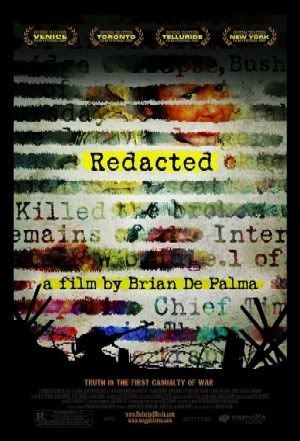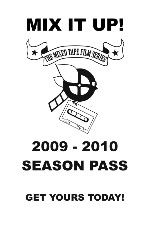Redacted review.

The Iraq War drama Redacted is the worst kind of 'controversial' film. What I mean to say is that it's a movie so poorly made and acted, that no one would have had any reason to see it or talk about it if all the right-wing pundits - many of whom never even saw the film - simply kept their mouths shut for a change.
Whether or not you agree with the politics of Redacted, it's a work of bad filmmaking, plain and simple. However, because these Fox News and radio personalities bashed the film on the air and in print, it has suddenly become a far more 'important' film than it had any right to be. Mark Cuban, the film's producer, wrote on his blog that Bill O' Reilly was his "new best friend." Now that I have seen the film, I think Cuban should buy O'Reilly some flowers and a gold watch, too.
Redacted is an entirely fictional faux-documentary based on the 2006 Mahmudiyah killings, wherein a group of U.S. soldiers raped a 14-year-old Iraqi girl, and killed her along with her younger sister and parents. In the fictional recreation, there are two soldiers who are directly involved in the assault. The two soldiers are played by actors Patrick Carroll and Daniel Stewart Sherman.
As characters, Carroll and Sherman's soldiers lack so much dimension, it's almost like the actors decided to play their characters at one speed: "villain." Their performances might have been passable as the bad guys in a cheap revenge movie from the 80's, but for a drama that demands to be taken seriously, it's very distracting. By the time we get to the rape scene, which should have been harrowing to watch, I was reduced to a state of apathy because of the duo's over-the-top performance and the exploitative manner in which it was shot.
Sherman's role as a soldier might very well be one of the greatest intentional casting blunders in film history, and I found him to be most distracting of all. The actor is too overweight to play a combat-ready soldier. This was obviously a cheap attempt by writer-director Brian DePalma to further demonize a character who was already bad enough because of his crimes, vulgarity and frequent racial slurs. On top of that, every time I saw Sherman onscreen, I couldn't help thinking that the U.S. military would not deploy a soldier who could not run, and would be the least-challenging target for enemy snipers.
But what really hurts Redacted from the very beginning is its premise of pretending to be a multi-media collage culled from several video sources. These sources include Middle-Eastern news footage, scenes from a French documentary, internet videos and a video diary from a U.S. soldier among others. Strangely, despite the fact that these videos supposedly came from different sources, most of them look like they were shot by the same photographer using the same cameras. While DePalma might have been kind enough to include a caption at the bottom of the screen to let us know where each source came from, it's apparent the filmmaker did not master their visual textures, styles or even potential.
Comprising most of the film is the video diary, which is also the most vexing of the movie's sources. The Hispanic soldier recording it (Izzy Diaz) claims to be doing so because he wants to get into film school. However, his footage is too dumbed-down by amateur editing transitions to believe anyone who studied film today - and had any hope of continuing to do so in college - would have used them. More importantly, since the film was culled from various sources, why wouldn't the 'real-life documentarian,' who purportedly combined the various footage together, not edit out all the foolish mistakes himself? Just because Redacted is a 'fake' documentary does not excuse it from the same criteria we give actual documentaries as well as all films in general. There's also the highly-contrived manner in which the soldier records the assault. Knowing the offending soldiers would not let him carry a video camera to record such damning evidence, the soldier gets his hands on a hidden camera which he installs on his helmet and then somehow manages to capture high-quality video. Where did the camera come from? The mail? Better yet, how was the soldier able to pay for it?
Having made well-polished films like "Scarface," "Blow-Out" and "Carrie," DePalma has proven to be skilled at what he does. That said, he's obviously out of his element with Redacted. A young visionary director could have handled the movie's faux multi-media aspirations, but DePalma was simply too old to learn the new tricks a movie like this would have required. Redacted should have been raw, and yet it felt overwrought; it should have been a natural portrait of life on the warfront, and yet it was a shallow melodrama; more importantly, it should have hit my brain like a well-aimed needle of subversion, and yet it knocked me down like a claw-hammer to the skull.




0 Comments:
Post a Comment
<< Home